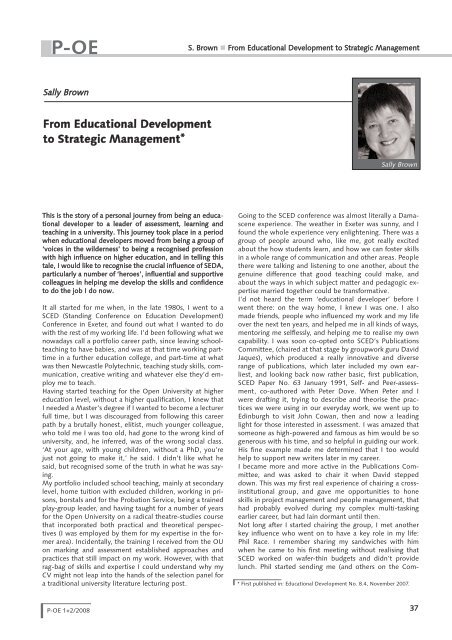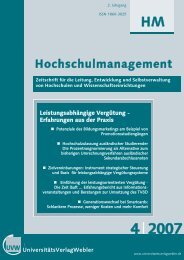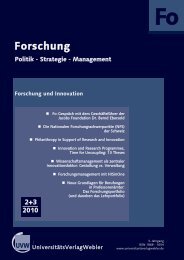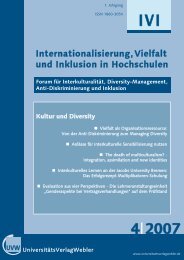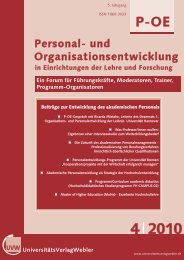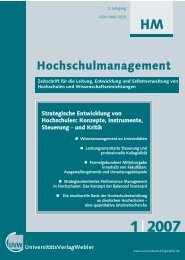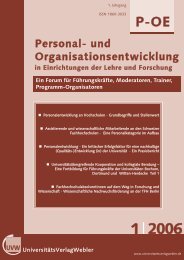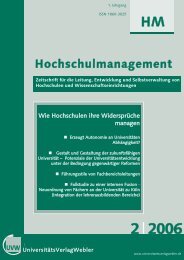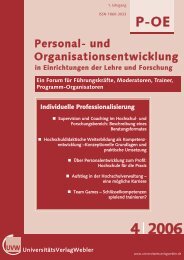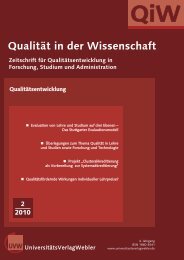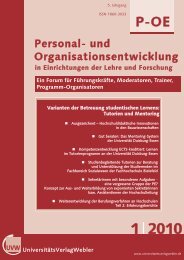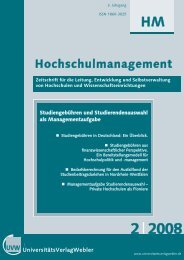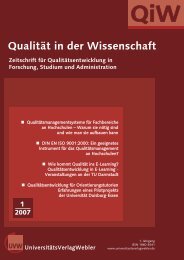P-OE - UniversitätsVerlagWebler
P-OE - UniversitätsVerlagWebler
P-OE - UniversitätsVerlagWebler
Sie wollen auch ein ePaper? Erhöhen Sie die Reichweite Ihrer Titel.
YUMPU macht aus Druck-PDFs automatisch weboptimierte ePaper, die Google liebt.
P-<strong>OE</strong><br />
S. Brown • From Educational Development to Strategic Management<br />
Sally Brown<br />
From Educational Development<br />
to Strategic Management *<br />
Sally Brown<br />
This is the story of a personal journey from being an educational<br />
developer to a leader of assessment, learning and<br />
teaching in a university. This journey took place in a period<br />
when educational developers moved from being a group of<br />
‘voices in the wilderness’ to being a recognised profession<br />
with high influence on higher education, and in telling this<br />
tale, I would like to recognise the crucial influence of SEDA,<br />
particularly a number of ‘heroes’, influential and supportive<br />
colleagues in helping me develop the skills and confidence<br />
to do the job I do now.<br />
It all started for me when, in the late 1980s, I went to a<br />
SCED (Standing Conference on Education Development)<br />
Conference in Exeter, and found out what I wanted to do<br />
with the rest of my working life. I’d been following what we<br />
nowadays call a portfolio career path, since leaving schoolteaching<br />
to have babies, and was at that time working parttime<br />
in a further education college, and part-time at what<br />
was then Newcastle Polytechnic, teaching study skills, communication,<br />
creative writing and whatever else they’d employ<br />
me to teach.<br />
Having started teaching for the Open University at higher<br />
education level, without a higher qualification, I knew that<br />
I needed a Master’s degree if I wanted to become a lecturer<br />
full time, but I was discouraged from following this career<br />
path by a brutally honest, elitist, much younger colleague,<br />
who told me I was too old, had gone to the wrong kind of<br />
university, and, he inferred, was of the wrong social class.<br />
‘At your age, with young children, without a PhD, you’re<br />
just not going to make it,’ he said. I didn’t like what he<br />
said, but recognised some of the truth in what he was saying.<br />
My portfolio included school teaching, mainly at secondary<br />
level, home tuition with excluded children, working in prisons,<br />
borstals and for the Probation Service, being a trained<br />
play-group leader, and having taught for a number of years<br />
for the Open University on a radical theatre-studies course<br />
that incorporated both practical and theoretical perspectives<br />
(I was employed by them for my expertise in the former<br />
area). Incidentally, the training I received from the OU<br />
on marking and assessment established approaches and<br />
practices that still impact on my work. However, with that<br />
rag-bag of skills and expertise I could understand why my<br />
CV might not leap into the hands of the selection panel for<br />
a traditional university literature lecturing post.<br />
Going to the SCED conference was almost literally a Damascene<br />
experience. The weather in Exeter was sunny, and I<br />
found the whole experience very enlightening. There was a<br />
group of people around who, like me, got really excited<br />
about the how students learn, and how we can foster skills<br />
in a whole range of communication and other areas. People<br />
there were talking and listening to one another, about the<br />
genuine difference that good teaching could make, and<br />
about the ways in which subject matter and pedagogic expertise<br />
married together could be transformative.<br />
I’d not heard the term ‘educational developer’ before I<br />
went there: on the way home, I knew I was one. I also<br />
made friends, people who influenced my work and my life<br />
over the next ten years, and helped me in all kinds of ways,<br />
mentoring me selflessly, and helping me to realise my own<br />
capability. I was soon co-opted onto SCED’s Publications<br />
Committee, (chaired at that stage by groupwork guru David<br />
Jaques), which produced a really innovative and diverse<br />
range of publications, which later included my own earliest,<br />
and looking back now rather basic, first publication,<br />
SCED Paper No. 63 January 1991, Self- and Peer-assessment,<br />
co-authored with Peter Dove. When Peter and I<br />
were drafting it, trying to describe and theorise the practices<br />
we were using in our everyday work, we went up to<br />
Edinburgh to visit John Cowan, then and now a leading<br />
light for those interested in assessment. I was amazed that<br />
someone as high-powered and famous as him would be so<br />
generous with his time, and so helpful in guiding our work.<br />
His fine example made me determined that I too would<br />
help to support new writers later in my career.<br />
I became more and more active in the Publications Committee,<br />
and was asked to chair it when David stepped<br />
down. This was my first real experience of chairing a crossinstitutional<br />
group, and gave me opportunities to hone<br />
skills in project management and people management, that<br />
had probably evolved during my complex multi-tasking<br />
earlier career, but had lain dormant until then.<br />
Not long after I started chairing the group, I met another<br />
key influence who went on to have a key role in my life:<br />
Phil Race. I remember sharing my sandwiches with him<br />
when he came to his first meeting without realising that<br />
SCED worked on wafer-thin budgets and didn’t provide<br />
lunch. Phil started sending me (and others on the Com-<br />
* First published in: Educational Development No. 8.4, November 2007.<br />
P-<strong>OE</strong> 1+2/2008<br />
37


